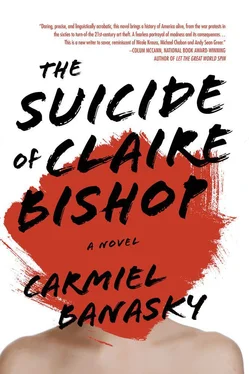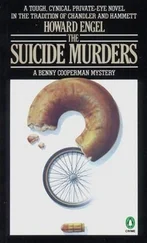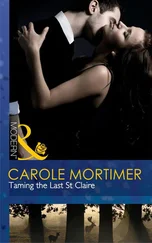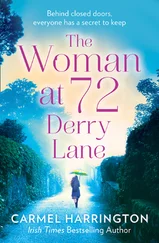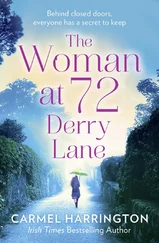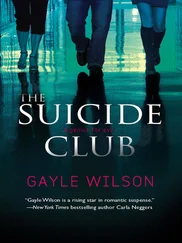She says, “Chicken. Chickens in the field.”
She says, “I never lost anything. Was that cheating? It feels like cheating.” Her breath is low, barely filling her lungs. She sighs. And her hospital gown, and her old lady skin, and her aches and pains, they seem to sigh off her, too.
I’m sitting beside her. I say, “He’s sorry.”
“Don’t you worry,” she whispers. “I’ve been making this decision every day of my life.”
Her hand tightens around mine. It stays tight, until it’s not.
That can’t be right. How can her hand not be tight? Her eyes are closed.
Her eyes are too closed. I hover over. I shake her tiny shoulders. I call out her name. Claire. I call out for Nicolette. She is not dying. This dying woman is not dying. I can’t be wrong. If I’m wrong—“I’m sorry,” I say. “I’m sorry.”
Where is Nicolette? She has to jump out from the shadows now.
I check under the bed. I check out the window. The window is black and cracking. Where is she? Has she ever been here? I am sitting on my heart. I’ve killed myself.
The walls are pulsing. On the verge of breaking. You chatter away, how wrong I am, how stupid and inconsequential. How no one was hurting Jules but me. No one.
No. I didn’t mean to. But she wanted. Have I killed her? I can’t help it, I’m crying — for the loss of it? Because I’ll miss this woman I’ve only just met? This good woman. As if she feels it too, I can see her last breath inside her, a torch lighting up everything. Time leaving her.
Premise 1 is false.
I open my mouth and a ticking sound escapes. A bomb I planted in myself, when I was away from myself. This is what it is to not trust your own brain. A foreign roar rings up the building and through my legs. The walls will crumble. The ocean is coming.
Three Nicolettes.
One left me long ago.
One I let fall.
The other led me here, to help her old friend.
When she painted me, when we laid together stomach to stomach, my Nicolette asked what it was like to be me. But how can you tell someone something like that, especially the person you love? Wouldn’t the truth drive them away? “I just want to be part of you,” she said. “Your arm, maybe. Preferably your heart. But,” she admitted, “not your brain.”
There are not only three Nicolettes. There is a fourth — inside me.
It’s her I’ve been looking for.
A truth has come unlocked. I am a million contradictions being juggled in real time.
Closer now. The sky will soon be all around us; the hospital will fall back to the sea. All the sad things in me are lit-up spheres. I have hardly begun.
Holding her hand, I start humming. Just so she knows. So she knows someone is here to sound out her life.
There are no more footsteps. No band of Hasidim. Just West and Claire. A woman who is dying. And the painting, just a painting. Not any painting — ours.
PREMISE 1: I AM MY TRUE SELF.
First the water sloshes down the corridors of the hospital. Roaring past the blood lab and the nurse’s station and the Alzheimer’s Research Center and the staff lounge where a med student tries to take the bra off another med student, and you feel it rip through the cancer ward and the hospital cafeteria. You hear it beat and rush like a heart, around the corner and down the tile hall, and you hear the door strike open as it pounds into the room. The doctors and nurses are carried off in a rush. The walls fall and float away. You are on the bed and rolling with the waves .
You are flooding the hospital, you are flooding up the street. You see the flower-heads of strangers bobbing down the current, off to work, off to drop their noses in a tonic, off to indulge or trade or slack, to city-live, completely unaware they are underwater, strewn like kelp. The sudden spray of ocean on your skin. You’re riding toward it, into it low and hard. You leave them all behind. This is all you need: the cloud shadows cast on water. Weird light falling on your eyes. Light dripping and bouncing, as if the sun had nothing better to do than show you beauty. Beside you, the painting is bobbing like a life raft. You see the clouds span the new gulf and seagulls mouth off at the wind and the underbelly of bridges .
Above is a bridge: it is your whole life. You could, if you felt like it, with just a short leap from your floating bed, climb on at any point. You could jump onto the bridge when your father is alive and smell the collar of his flannel coat, the one that is later eaten through by moths because you steal the mothballs to play with as a child. You can live before the diagnosis, before you pulled your sister’s hair, before you hurt her again. You can fling yourself to where your mother is healthy, or when you carry that slap in your hand, or when Mary is near, or the day you first met Nicolette. Moments shift and shimmer like flecks of light on water .
You are alone now, under the bridge, in the middle of nothing and the water’s warm. You are in the water and you are the water. And the hospital bed bobs up and down on the waves, catching and tossing fingers of light. What a thrill, what a thrill to be suspended in time like this. What a way to finally see the ocean, the terrible, indifferent, beautiful ocean you were once so afraid of. You stand up, body acting as it did before it was sick. But it is the memory of a body, standing on the edge of the memory of a bed, toes tucked around the lip, feeling the starchy sheet fold under them. As the wave swells, you grab hold of the underside of the bridge. You climb onto it .
There is someone waiting, always waiting for you. A woman with cropped dark hair and welling eyes. She is waving you onward .
Here, the sky is forever in front of you. Away and away it goes, the dim firmament splashed with gulls, and crows like paint splotches on the horizon. Here you are so alive. You are alive, you are alive, you are ready .
Dive in .
